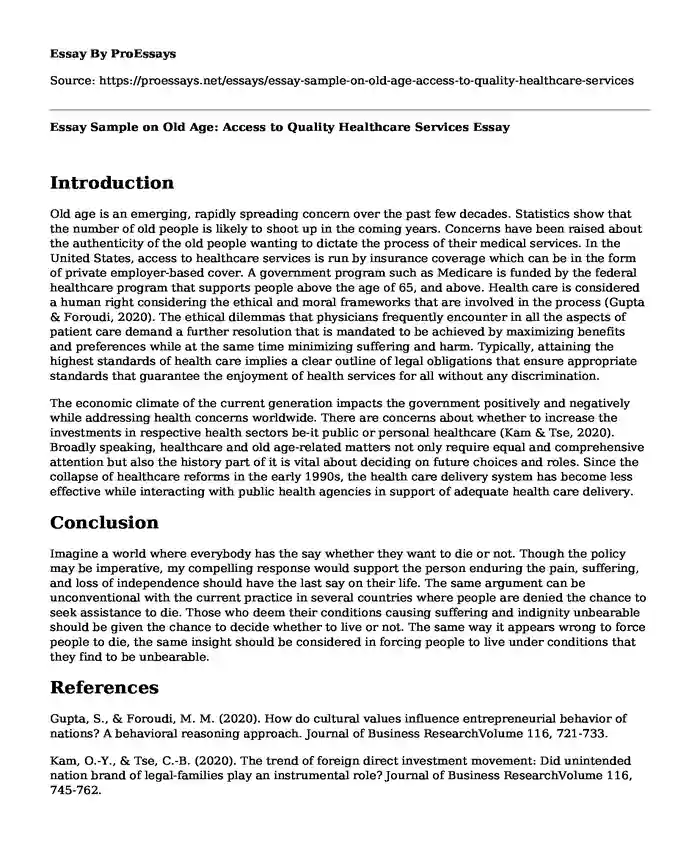Introduction
Old age is an emerging, rapidly spreading concern over the past few decades. Statistics show that the number of old people is likely to shoot up in the coming years. Concerns have been raised about the authenticity of the old people wanting to dictate the process of their medical services. In the United States, access to healthcare services is run by insurance coverage which can be in the form of private employer-based cover. A government program such as Medicare is funded by the federal healthcare program that supports people above the age of 65, and above. Health care is considered a human right considering the ethical and moral frameworks that are involved in the process (Gupta & Foroudi, 2020). The ethical dilemmas that physicians frequently encounter in all the aspects of patient care demand a further resolution that is mandated to be achieved by maximizing benefits and preferences while at the same time minimizing suffering and harm. Typically, attaining the highest standards of health care implies a clear outline of legal obligations that ensure appropriate standards that guarantee the enjoyment of health services for all without any discrimination.
The economic climate of the current generation impacts the government positively and negatively while addressing health concerns worldwide. There are concerns about whether to increase the investments in respective health sectors be-it public or personal healthcare (Kam & Tse, 2020). Broadly speaking, healthcare and old age-related matters not only require equal and comprehensive attention but also the history part of it is vital about deciding on future choices and roles. Since the collapse of healthcare reforms in the early 1990s, the health care delivery system has become less effective while interacting with public health agencies in support of adequate health care delivery.
Conclusion
Imagine a world where everybody has the say whether they want to die or not. Though the policy may be imperative, my compelling response would support the person enduring the pain, suffering, and loss of independence should have the last say on their life. The same argument can be unconventional with the current practice in several countries where people are denied the chance to seek assistance to die. Those who deem their conditions causing suffering and indignity unbearable should be given the chance to decide whether to live or not. The same way it appears wrong to force people to die, the same insight should be considered in forcing people to live under conditions that they find to be unbearable.
References
Gupta, S., & Foroudi, M. M. (2020). How do cultural values influence entrepreneurial behavior of nations? A behavioral reasoning approach. Journal of Business ResearchVolume 116, 721-733.
Kam, O.-Y., & Tse, C.-B. (2020). The trend of foreign direct investment movement: Did unintended nation brand of legal-families play an instrumental role? Journal of Business ResearchVolume 116, 745-762.
Karsoho, H., Fishman, J. R., & Wright, D. K. (2016). Suffering and medicalization at the end of life: The case of physician-assisted dying. Social Science & MedicineVolume 170, 188-196.
Marjanovic-Shane, A., & Meacham, S. (2019). Idea-dying in critical ontological pedagogical dialogue. Learning, Culture and Social InteractionVolume 20, 68-79.
Cite this page
Essay Sample on Old Age: Access to Quality Healthcare Services. (2023, Sep 15). Retrieved from https://proessays.net/essays/essay-sample-on-old-age-access-to-quality-healthcare-services
If you are the original author of this essay and no longer wish to have it published on the ProEssays website, please click below to request its removal:
- Awareness of Light
- Essay on Opioid Epidemic in the United States
- Organizational Systems and Structural Leaderships: Root Cause Analysis
- Left Wing Media Bias Essay Example
- Essay Example on Can Diet Strengthen Immune System & Prevent Illness?
- Rising Pharmaceutical Prices: A Cause for Concern - Essay Sample
- Definitional Difference between "Brain" and "Mind" - Free Report







